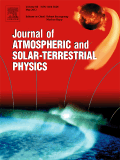
JOURNAL OF ATMOSPHERIC AND SOLAR-TERRESTRIAL PHYSICS
Scope & Guideline
Advancing Knowledge in Atmospheric and Space Sciences
Introduction
Aims and Scopes
- Atmospheric Dynamics and Weather Patterns:
Research focusing on the analysis and modeling of atmospheric phenomena, including precipitation, storms, and climate variability, utilizing observational data and numerical simulations. - Solar-Terrestrial Interactions:
Investigations into how solar activity, such as solar flares and coronal mass ejections, impacts the Earth's atmosphere and magnetosphere, influencing weather and climate. - Ionospheric Studies:
Exploration of ionospheric behavior, including electron density variations, scintillation, and irregularities, particularly in relation to geomagnetic storms and solar activity. - Remote Sensing and Satellite Observations:
Utilization of satellite data for monitoring atmospheric conditions, including aerosol distributions, cloud properties, and surface radiation measurements. - Machine Learning and Data Analysis:
Application of machine learning techniques to analyze complex atmospheric datasets, enhance predictive models, and derive insights from observational data. - Space Weather Phenomena:
Research on space weather events and their terrestrial impacts, including geomagnetic storms, cosmic ray variations, and their effects on technology and human activities. - Climate Change and Variability:
Studies addressing the implications of climate change on atmospheric processes, including long-term trends, extreme weather events, and regional impacts.
Trending and Emerging
- Machine Learning Applications:
There is a growing trend in employing machine learning techniques for atmospheric predictions, data assimilation, and analysis of complex datasets, indicating a shift towards more sophisticated analytical methods. - Impact of Climate Change on Extreme Weather:
Research focusing on the relationship between climate change and extreme weather events is increasingly prominent, reflecting global concerns about climate resilience and adaptation. - Interdisciplinary Approaches to Atmospheric Studies:
Emerging themes highlight interdisciplinary studies that integrate atmospheric science with fields such as geology, space weather, and environmental science, showing a trend towards holistic understanding. - Satellite Remote Sensing Innovations:
Advancements in satellite technologies and methodologies for atmospheric monitoring are becoming a significant focus, enhancing the capacity to observe and analyze atmospheric phenomena. - Space Weather and Technological Impacts:
The exploration of space weather phenomena and their implications for technology, particularly in communication and navigation systems, is increasingly relevant in the current research landscape.
Declining or Waning
- Localized Atmospheric Phenomena Studies:
Research addressing localized atmospheric events, such as specific thunderstorm or fog case studies, appears to be less frequent compared to broader studies involving regional or global phenomena. - Traditional Climate Modeling Approaches:
There is a noticeable decline in the use of conventional climate models without integration of advanced machine learning techniques or data assimilation methods, as the field shifts towards more innovative approaches. - Historical Solar Activity Analysis:
Research focusing on historical solar cycles and their effects on the Earth’s atmosphere has decreased, likely due to a shift towards immediate and predictive studies. - Basic Observational Studies:
Basic observational studies without significant data analysis or modeling components are less common, as the journal gravitates towards more complex, data-driven research.
Similar Journals
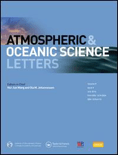
Atmospheric and Oceanic Science Letters
Bridging the Gap Between Atmosphere and OceanAtmospheric and Oceanic Science Letters is a premier open-access journal dedicated to the rapidly evolving fields of atmospheric science and oceanography. Published by KEAI PUBLISHING LTD, this journal aims to foster research dissemination and collaboration by providing a platform for high-quality research articles, reviews, and case studies that address critical issues impacting atmospheric and oceanic systems. With an impressive impact factor reflecting its esteemed position—including being ranked Q2 in Atmospheric Science and Q1 in Oceanography in 2023—this journal is an essential resource for researchers, professionals, and students alike. The journal's Open Access model, adopted since 2016, ensures that groundbreaking research is readily available to a global audience, enhancing knowledge transfer and facilitating innovative solutions to environmental challenges. Operating out of the United Kingdom and reaching an international readership, Atmospheric and Oceanic Science Letters plays a pivotal role in shaping our understanding of the interactions between the atmosphere and oceans, making it a vital publication for anyone aiming to stay at the forefront of these dynamic scientific fields.
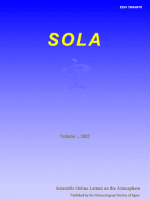
SOLA
Advancing atmospheric science through open collaboration.SOLA is a distinguished journal published by the Meteorological Society of Japan, focusing on cutting-edge research in the field of atmospheric science. Since transitioning to an Open Access model in 2018, SOLA aims to facilitate the dissemination of knowledge and foster collaboration among researchers from around the globe. With a proud history spanning from 2005 to 2024, the journal has earned a reputation for high-quality publications, achieving a Q1 ranking in Atmospheric Science according to the 2023 category quartiles. Although its H-Index is currently not available, SOLA is recognized in Scopus rankings, standing at #82 out of 148 in Earth and Planetary Sciences, demonstrating its impact in the field. With its headquarters in Tokyo, Japan, and an unwavering commitment to advancing scientific understanding, SOLA serves as an essential resource for researchers, professionals, and students dedicated to exploring the complexities of atmospheric phenomena.

Asia-Pacific Journal of Atmospheric Sciences
Connecting Scholars Across the Asia-Pacific RegionWelcome to the Asia-Pacific Journal of Atmospheric Sciences, a leading publication in the field of atmospheric science, published by the Korean Meteorological Society. With an ISSN of 1976-7633 and an E-ISSN of 1976-7951, this journal has been a cornerstone for researchers and practitioners in the atmospheric sciences since its inception in 2008. Recognized for its rigorous peer-reviewed articles, it holds a commendable Q2 quartile ranking in 2023 and is placed at the 51st rank out of 148 in the Earth and Planetary Sciences, reflecting its impact within the community with a 65th percentile. The journal features a broad scope encompassing meteorology, climatology, and environmental sciences, making it an essential resource for scholars and industry experts alike. As an open access journal, it ensures that groundbreaking research is widely accessible, fostering collaboration and innovation across the Asia-Pacific region and beyond. Explore the latest findings and advancements in atmospheric sciences and contribute to the dynamic field of climate research through the journal's engaging content.

Atmospheric Science Letters
Bridging theory and practice in atmospheric research.Atmospheric Science Letters, published by WILEY, is a leading open-access journal in the field of Atmospheric Science. Since its establishment in 2000, it has significantly contributed to advancing knowledge related to the Earth's atmosphere, focusing on both theoretical and practical aspects. With an impressive Q2 ranking in the Atmosphere Science category as of 2023 and a Scopus rank of 62 out of 148, this journal provides a platform for researchers and professionals to share their findings and insights. The journal’s commitment to open access since 2016 ensures that cutting-edge research is accessible to a global audience, fostering collaboration and innovation in the atmospheric sciences. Addressed from its headquarters at 111 River St, Hoboken, NJ, USA, Atmospheric Science Letters is pivotal for students, researchers, and professionals seeking to stay abreast of the latest developments in this dynamic field.
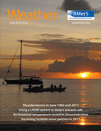
Weather
Fostering Insights in Atmospheric DynamicsWeather is a prestigious academic journal published by WILEY, specializing in the field of Atmospheric Science. Since its inception in 1946, the journal has emerged as a key resource for researchers, professionals, and students seeking to deepen their understanding of meteorological phenomena and climate dynamics. Weather is recognized for its robust impact within the scientific community, boasting a 2023 Scopus ranking of 96 out of 148 in the Earth and Planetary Sciences category, placing it comfortably within the Q2 category. Although it does not offer open access options, the journal is committed to publishing high-quality, peer-reviewed articles that advance the knowledge base of atmospheric sciences up to 2024. Through its diverse range of research, reviews, and case studies, Weather continues to play a vital role in facilitating discussions and discoveries in this essential field of study.
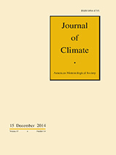
JOURNAL OF CLIMATE
Driving Innovation in Atmospheric ResearchThe JOURNAL OF CLIMATE, published by the American Meteorological Society, stands as a premier source of cutting-edge research in the field of atmospheric science. With an impressive impact factor reflecting its rigorous peer-review process, this journal ranks in the top 20 of its category according to Scopus, with a remarkable percentile of 88th. Since its inception in 1988, the JOURNAL OF CLIMATE has been a vital platform for disseminating high-quality studies that deepen our understanding of climate systems and their global implications. It serves a diverse audience of researchers, professionals, and students interested in climate variability, climate change, and the dynamics of atmospheric processes. Though not an open-access journal, it offers wide accessibility through numerous academic repositories. As it continues to publish essential findings up to 2024, this journal plays a crucial role in advancing knowledge and fostering dialogue within the atmospheric science community.

Tethys-Journal of Mediterranean Meteorology & Climatology
Bridging Research and Climate Solutions in the MediterraneanTethys - Journal of Mediterranean Meteorology & Climatology, published by the Associació Catalana de Meteorologia (ACAM), serves as a specialized platform dedicated to advancing the study of meteorological and climatological phenomena within the Mediterranean region. With a Scopus Rank of #94 out of 148 in the field of Atmospheric Science, this journal is positioned in the Q4 category, reflecting a growing recognition among researchers focused on regional climate variations and environmental challenges. Established in 2012 and publishing through 2023, Tethys aims to provide open access to high-quality research articles that address critical issues impacting climate and weather patterns, thus contributing to a deeper understanding of Mediterranean meteorology. The journal’s mission aligns closely with the increasing global emphasis on climate studies and serves as an essential resource for academics, practitioners, and students dedicated to sustainably addressing the environmental and climatic challenges faced by this diverse and dynamic region.
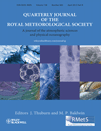
QUARTERLY JOURNAL OF THE ROYAL METEOROLOGICAL SOCIETY
Championing significant contributions to planetary sciences.The Quarterly Journal of the Royal Meteorological Society, published by Wiley, stands as a prestigious platform in the field of Atmospheric Science, with a commendable impact reflected in its Q1 quartile ranking and a notable Scopus rank of 4th out of 148, placing it in the 97th percentile among its peers. With origins tracing back to 1873, this journal has established itself as a cornerstone for disseminating high-quality research, engaging articles, and innovative methodologies that advance our understanding of meteorological phenomena. Although it is not an open-access journal, the rigorous peer-review process ensures that only the most significant contributions are published, making it essential reading for researchers, professionals, and students dedicated to atmospheric and planetary sciences. For those interested in cutting-edge findings and comprehensive reviews, the Quarterly Journal of the Royal Meteorological Society is an invaluable resource in enhancing scientific knowledge and collaboration in this dynamic and evolving field.

JOURNAL OF THE METEOROLOGICAL SOCIETY OF JAPAN
Advancing Atmospheric Knowledge Since 1905Journal of the Meteorological Society of Japan, ISSN 0026-1165 (E-ISSN 2186-9057), is a leading academic journal published by the Meteorological Society of Japan, dedicated to advancing the field of atmospheric sciences. Established in 1905, the journal has a long-standing tradition of publishing high-quality research that contributes to our understanding of meteorology, climatology, and environmental science. As an Open Access journal since 2018, it ensures wide dissemination of knowledge, allowing researchers, professionals, and students to access cutting-edge studies without barriers. With an impressive impact factor and ranked in the Q1 category in Atmospheric Science, it is recognized for its significant contributions, currently holding a Scopus rank of #36 out of 148 in the field. The journal serves as a vital resource for those involved in meteorological research, policy-making, and education, fostering collaboration and innovation within and beyond Japan.

ATMOSFERA
Bridging Research and Environmental UnderstandingATMOSFERA is a prestigious journal published by CENTRO CIENCIAS ATMOSFERA UNAM, dedicated to advancing the field of Atmospheric Science. With an ISSN of 0187-6236 and an E-ISSN of 2395-8812, this bilingual journal has been a vital resource for researchers since its inception in 1988. Located in Mexico City, the journal serves as a platform for high-quality original research, reviews, and case studies that explore various atmospheric phenomena, climate issues, and environmental challenges. Although currently categorized in the Q4 quartile of Atmospheric Science, ATMOSFERA aims to contribute to the growing body of knowledge in the field and improve its ranking over the next few years, emphasizing rigorous scientific inquiry and fostering collaboration among scholars. Its accessibility and commitment to open communication make it an essential reference for professionals and students striving to understand and address complex atmospheric dynamics.